Psychology Report: Theories, Factors, and Mental Health in Care
VerifiedAdded on 2023/03/24
|18
|4669
|72
Report
AI Summary
This report provides a comprehensive overview of psychological theories and their application within the context of health and social care. It begins by exploring different theories of lifespan development, including Freud's psychosexual and Erikson's psychosocial stages, along with a comparison of cognitive and psychodynamic theories. The report then examines psychological theories such as behavioral, cognitive, psychodynamic, and humanistic, and their relevance across different life stages, from infancy to late adulthood. It also discusses the social and biological factors influencing human behavior, using a case study of a child with speech difficulties to illustrate these influences. Furthermore, the report delves into the application of psychological theories in understanding stress, behavioral disturbances, and mental disorders, evaluating the impact of psychological principles on behavioral change and highlighting the significance of these theories in enhancing understanding within health and social care settings. The report concludes by summarizing key findings and emphasizing the practical implications of psychological theories in improving health and social care practices.
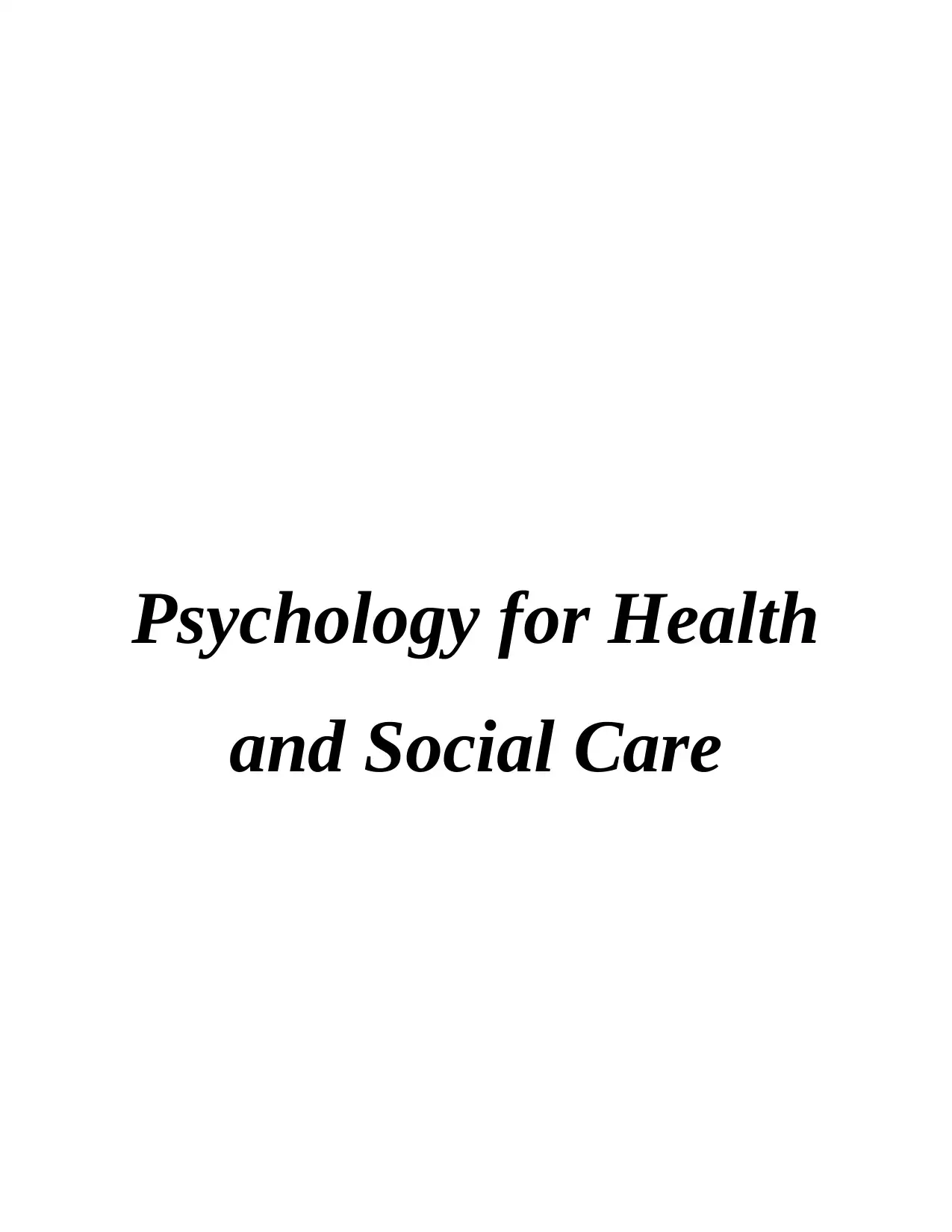
Psychology for Health
and Social Care
and Social Care
Paraphrase This Document
Need a fresh take? Get an instant paraphrase of this document with our AI Paraphraser
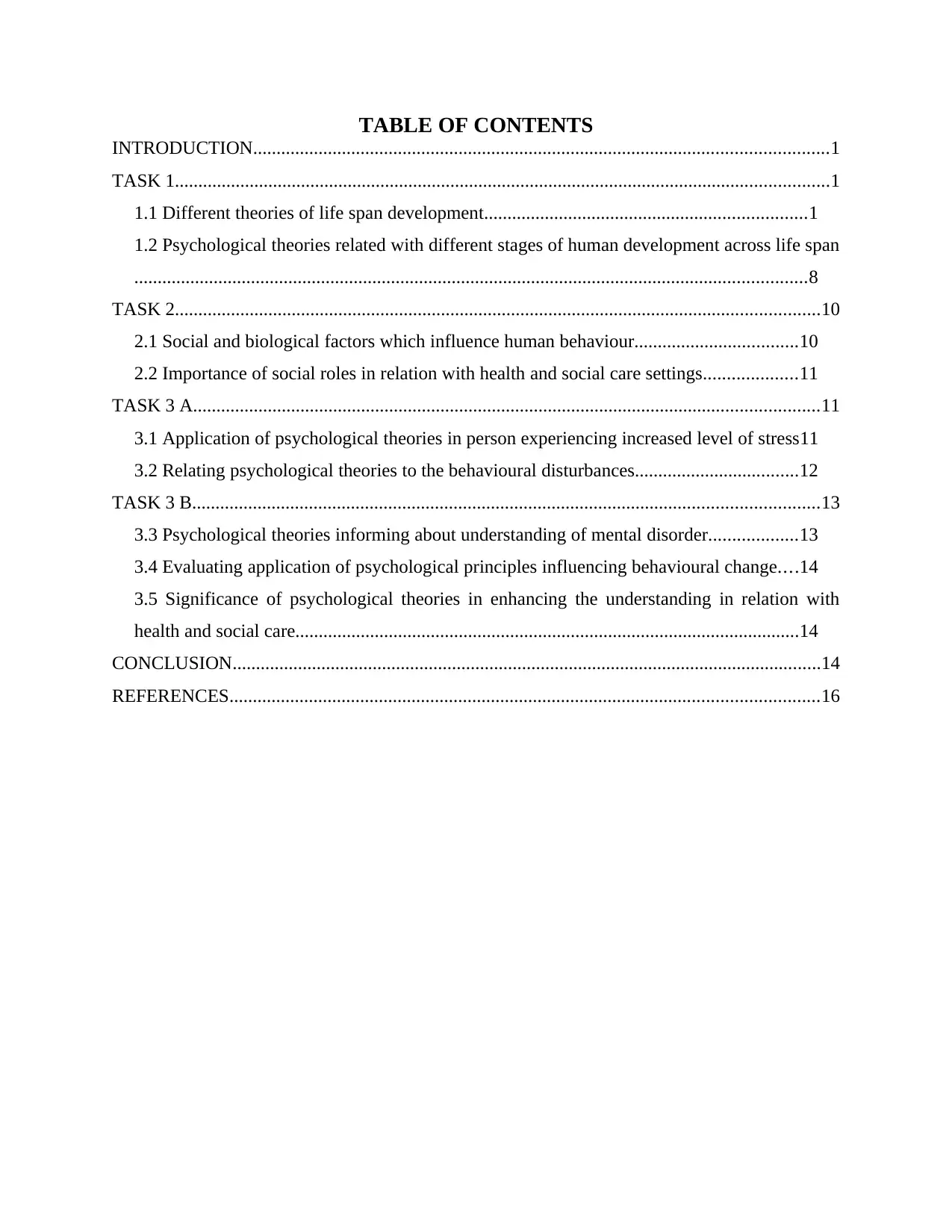
TABLE OF CONTENTS
INTRODUCTION...........................................................................................................................1
TASK 1............................................................................................................................................1
1.1 Different theories of life span development.....................................................................1
1.2 Psychological theories related with different stages of human development across life span
................................................................................................................................................8
TASK 2..........................................................................................................................................10
2.1 Social and biological factors which influence human behaviour...................................10
2.2 Importance of social roles in relation with health and social care settings....................11
TASK 3 A......................................................................................................................................11
3.1 Application of psychological theories in person experiencing increased level of stress11
3.2 Relating psychological theories to the behavioural disturbances...................................12
TASK 3 B......................................................................................................................................13
3.3 Psychological theories informing about understanding of mental disorder...................13
3.4 Evaluating application of psychological principles influencing behavioural change....14
3.5 Significance of psychological theories in enhancing the understanding in relation with
health and social care............................................................................................................14
CONCLUSION..............................................................................................................................14
REFERENCES..............................................................................................................................16
INTRODUCTION...........................................................................................................................1
TASK 1............................................................................................................................................1
1.1 Different theories of life span development.....................................................................1
1.2 Psychological theories related with different stages of human development across life span
................................................................................................................................................8
TASK 2..........................................................................................................................................10
2.1 Social and biological factors which influence human behaviour...................................10
2.2 Importance of social roles in relation with health and social care settings....................11
TASK 3 A......................................................................................................................................11
3.1 Application of psychological theories in person experiencing increased level of stress11
3.2 Relating psychological theories to the behavioural disturbances...................................12
TASK 3 B......................................................................................................................................13
3.3 Psychological theories informing about understanding of mental disorder...................13
3.4 Evaluating application of psychological principles influencing behavioural change....14
3.5 Significance of psychological theories in enhancing the understanding in relation with
health and social care............................................................................................................14
CONCLUSION..............................................................................................................................14
REFERENCES..............................................................................................................................16
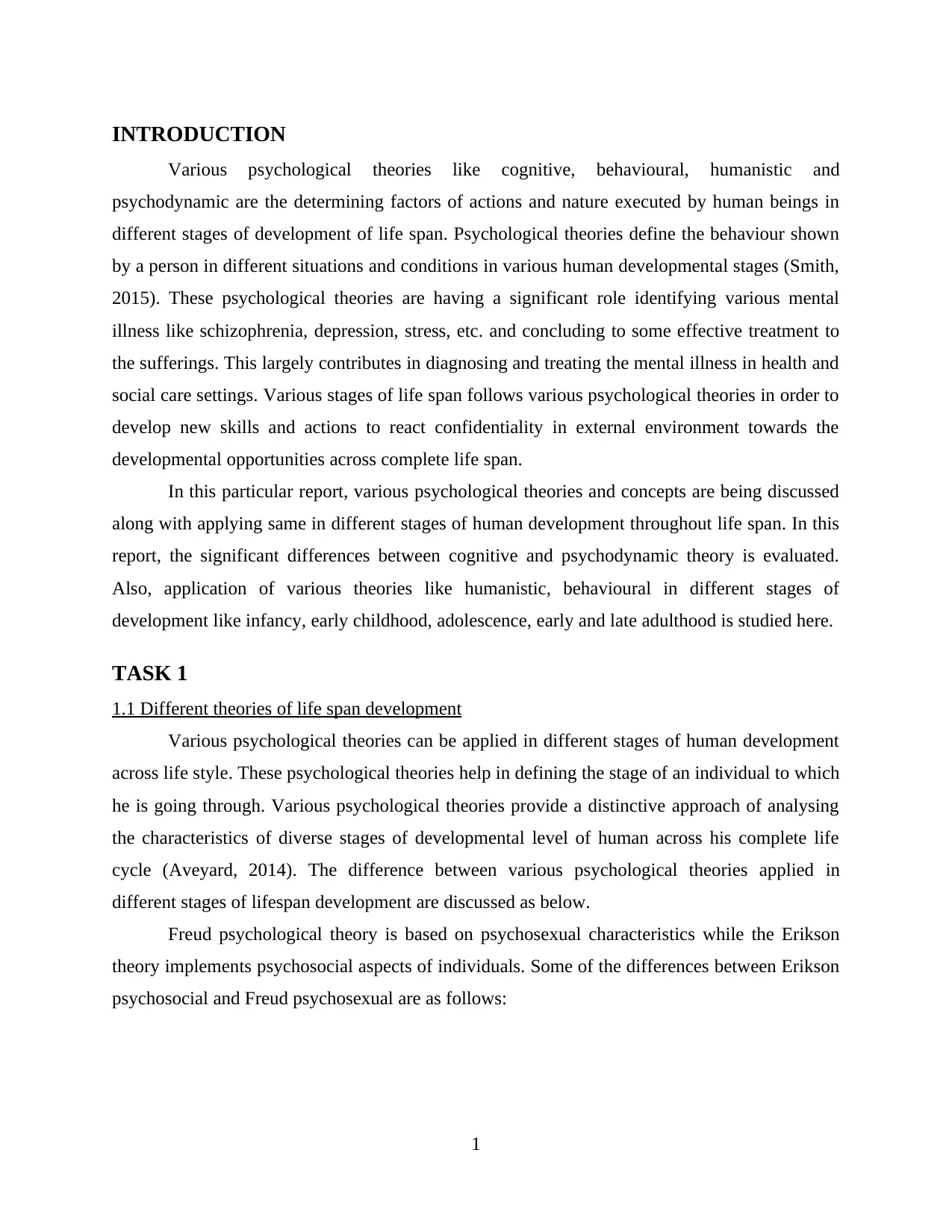
INTRODUCTION
Various psychological theories like cognitive, behavioural, humanistic and
psychodynamic are the determining factors of actions and nature executed by human beings in
different stages of development of life span. Psychological theories define the behaviour shown
by a person in different situations and conditions in various human developmental stages (Smith,
2015). These psychological theories are having a significant role identifying various mental
illness like schizophrenia, depression, stress, etc. and concluding to some effective treatment to
the sufferings. This largely contributes in diagnosing and treating the mental illness in health and
social care settings. Various stages of life span follows various psychological theories in order to
develop new skills and actions to react confidentiality in external environment towards the
developmental opportunities across complete life span.
In this particular report, various psychological theories and concepts are being discussed
along with applying same in different stages of human development throughout life span. In this
report, the significant differences between cognitive and psychodynamic theory is evaluated.
Also, application of various theories like humanistic, behavioural in different stages of
development like infancy, early childhood, adolescence, early and late adulthood is studied here.
TASK 1
1.1 Different theories of life span development
Various psychological theories can be applied in different stages of human development
across life style. These psychological theories help in defining the stage of an individual to which
he is going through. Various psychological theories provide a distinctive approach of analysing
the characteristics of diverse stages of developmental level of human across his complete life
cycle (Aveyard, 2014). The difference between various psychological theories applied in
different stages of lifespan development are discussed as below.
Freud psychological theory is based on psychosexual characteristics while the Erikson
theory implements psychosocial aspects of individuals. Some of the differences between Erikson
psychosocial and Freud psychosexual are as follows:
1
Various psychological theories like cognitive, behavioural, humanistic and
psychodynamic are the determining factors of actions and nature executed by human beings in
different stages of development of life span. Psychological theories define the behaviour shown
by a person in different situations and conditions in various human developmental stages (Smith,
2015). These psychological theories are having a significant role identifying various mental
illness like schizophrenia, depression, stress, etc. and concluding to some effective treatment to
the sufferings. This largely contributes in diagnosing and treating the mental illness in health and
social care settings. Various stages of life span follows various psychological theories in order to
develop new skills and actions to react confidentiality in external environment towards the
developmental opportunities across complete life span.
In this particular report, various psychological theories and concepts are being discussed
along with applying same in different stages of human development throughout life span. In this
report, the significant differences between cognitive and psychodynamic theory is evaluated.
Also, application of various theories like humanistic, behavioural in different stages of
development like infancy, early childhood, adolescence, early and late adulthood is studied here.
TASK 1
1.1 Different theories of life span development
Various psychological theories can be applied in different stages of human development
across life style. These psychological theories help in defining the stage of an individual to which
he is going through. Various psychological theories provide a distinctive approach of analysing
the characteristics of diverse stages of developmental level of human across his complete life
cycle (Aveyard, 2014). The difference between various psychological theories applied in
different stages of lifespan development are discussed as below.
Freud psychological theory is based on psychosexual characteristics while the Erikson
theory implements psychosocial aspects of individuals. Some of the differences between Erikson
psychosocial and Freud psychosexual are as follows:
1
⊘ This is a preview!⊘
Do you want full access?
Subscribe today to unlock all pages.

Trusted by 1+ million students worldwide
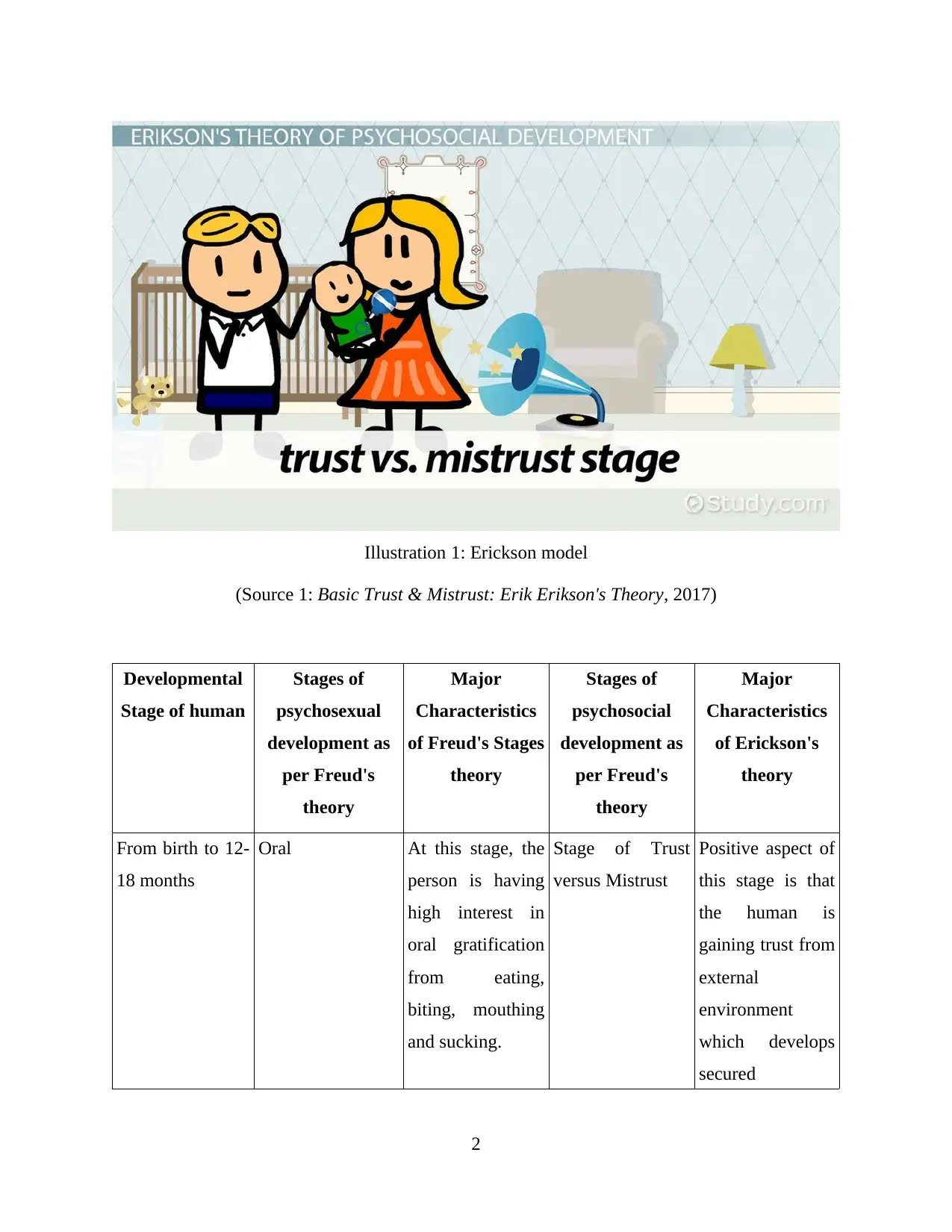
Developmental
Stage of human
Stages of
psychosexual
development as
per Freud's
theory
Major
Characteristics
of Freud's Stages
theory
Stages of
psychosocial
development as
per Freud's
theory
Major
Characteristics
of Erickson's
theory
From birth to 12-
18 months
Oral At this stage, the
person is having
high interest in
oral gratification
from eating,
biting, mouthing
and sucking.
Stage of Trust
versus Mistrust
Positive aspect of
this stage is that
the human is
gaining trust from
external
environment
which develops
secured
2
Illustration 1: Erickson model
(Source 1: Basic Trust & Mistrust: Erik Erikson's Theory, 2017)
Stage of human
Stages of
psychosexual
development as
per Freud's
theory
Major
Characteristics
of Freud's Stages
theory
Stages of
psychosocial
development as
per Freud's
theory
Major
Characteristics
of Erickson's
theory
From birth to 12-
18 months
Oral At this stage, the
person is having
high interest in
oral gratification
from eating,
biting, mouthing
and sucking.
Stage of Trust
versus Mistrust
Positive aspect of
this stage is that
the human is
gaining trust from
external
environment
which develops
secured
2
Illustration 1: Erickson model
(Source 1: Basic Trust & Mistrust: Erik Erikson's Theory, 2017)
Paraphrase This Document
Need a fresh take? Get an instant paraphrase of this document with our AI Paraphraser
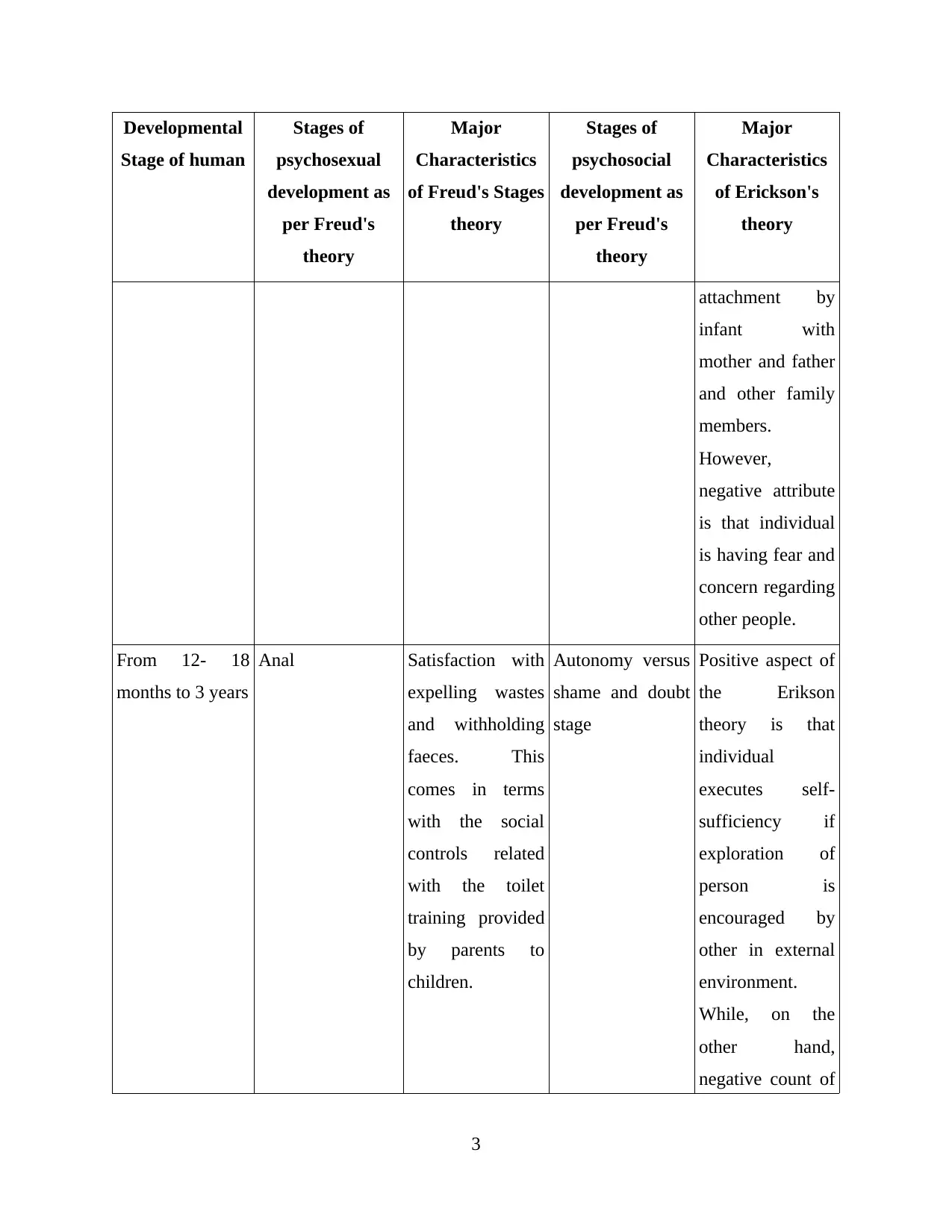
Developmental
Stage of human
Stages of
psychosexual
development as
per Freud's
theory
Major
Characteristics
of Freud's Stages
theory
Stages of
psychosocial
development as
per Freud's
theory
Major
Characteristics
of Erickson's
theory
attachment by
infant with
mother and father
and other family
members.
However,
negative attribute
is that individual
is having fear and
concern regarding
other people.
From 12- 18
months to 3 years
Anal Satisfaction with
expelling wastes
and withholding
faeces. This
comes in terms
with the social
controls related
with the toilet
training provided
by parents to
children.
Autonomy versus
shame and doubt
stage
Positive aspect of
the Erikson
theory is that
individual
executes self-
sufficiency if
exploration of
person is
encouraged by
other in external
environment.
While, on the
other hand,
negative count of
3
Stage of human
Stages of
psychosexual
development as
per Freud's
theory
Major
Characteristics
of Freud's Stages
theory
Stages of
psychosocial
development as
per Freud's
theory
Major
Characteristics
of Erickson's
theory
attachment by
infant with
mother and father
and other family
members.
However,
negative attribute
is that individual
is having fear and
concern regarding
other people.
From 12- 18
months to 3 years
Anal Satisfaction with
expelling wastes
and withholding
faeces. This
comes in terms
with the social
controls related
with the toilet
training provided
by parents to
children.
Autonomy versus
shame and doubt
stage
Positive aspect of
the Erikson
theory is that
individual
executes self-
sufficiency if
exploration of
person is
encouraged by
other in external
environment.
While, on the
other hand,
negative count of
3
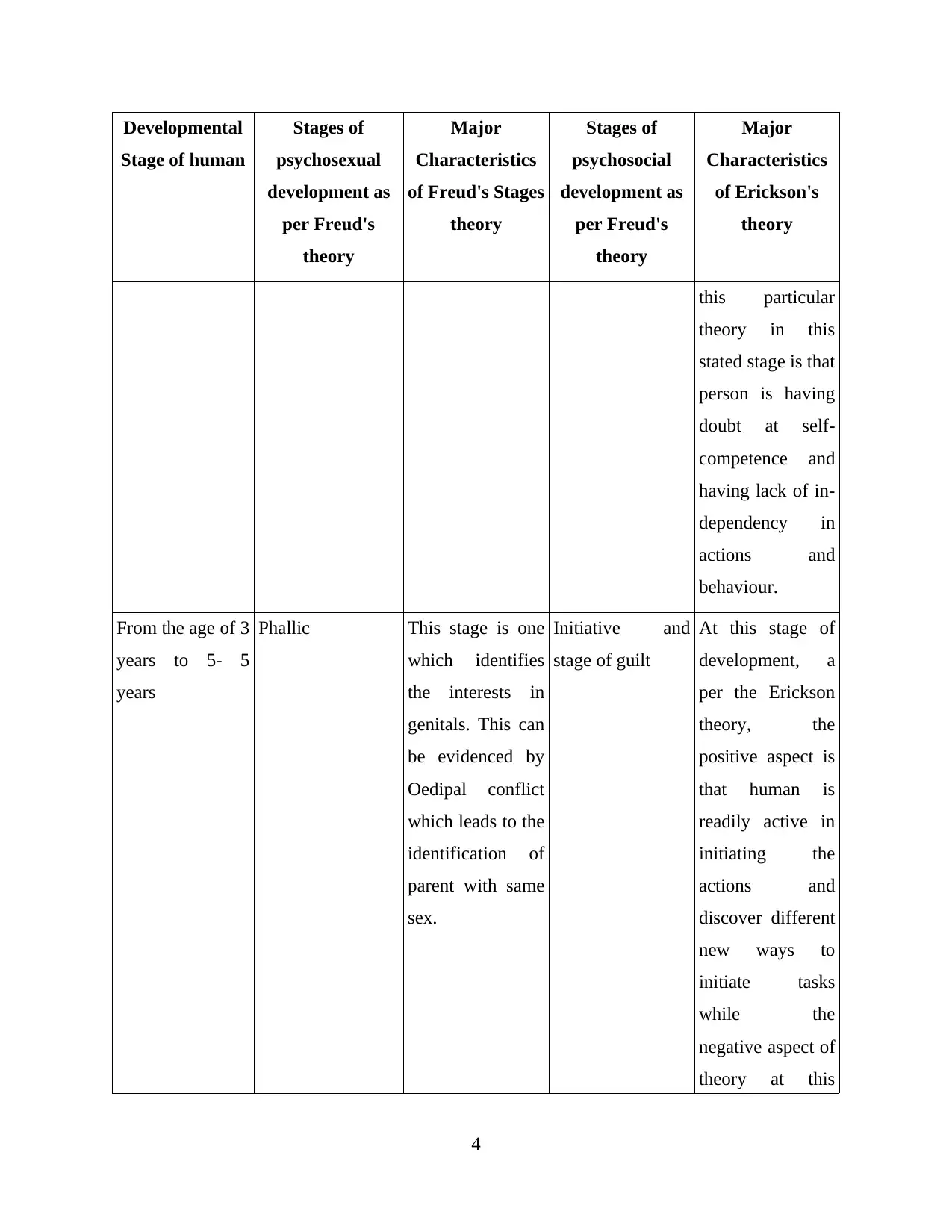
Developmental
Stage of human
Stages of
psychosexual
development as
per Freud's
theory
Major
Characteristics
of Freud's Stages
theory
Stages of
psychosocial
development as
per Freud's
theory
Major
Characteristics
of Erickson's
theory
this particular
theory in this
stated stage is that
person is having
doubt at self-
competence and
having lack of in-
dependency in
actions and
behaviour.
From the age of 3
years to 5- 5
years
Phallic This stage is one
which identifies
the interests in
genitals. This can
be evidenced by
Oedipal conflict
which leads to the
identification of
parent with same
sex.
Initiative and
stage of guilt
At this stage of
development, a
per the Erickson
theory, the
positive aspect is
that human is
readily active in
initiating the
actions and
discover different
new ways to
initiate tasks
while the
negative aspect of
theory at this
4
Stage of human
Stages of
psychosexual
development as
per Freud's
theory
Major
Characteristics
of Freud's Stages
theory
Stages of
psychosocial
development as
per Freud's
theory
Major
Characteristics
of Erickson's
theory
this particular
theory in this
stated stage is that
person is having
doubt at self-
competence and
having lack of in-
dependency in
actions and
behaviour.
From the age of 3
years to 5- 5
years
Phallic This stage is one
which identifies
the interests in
genitals. This can
be evidenced by
Oedipal conflict
which leads to the
identification of
parent with same
sex.
Initiative and
stage of guilt
At this stage of
development, a
per the Erickson
theory, the
positive aspect is
that human is
readily active in
initiating the
actions and
discover different
new ways to
initiate tasks
while the
negative aspect of
theory at this
4
⊘ This is a preview!⊘
Do you want full access?
Subscribe today to unlock all pages.

Trusted by 1+ million students worldwide
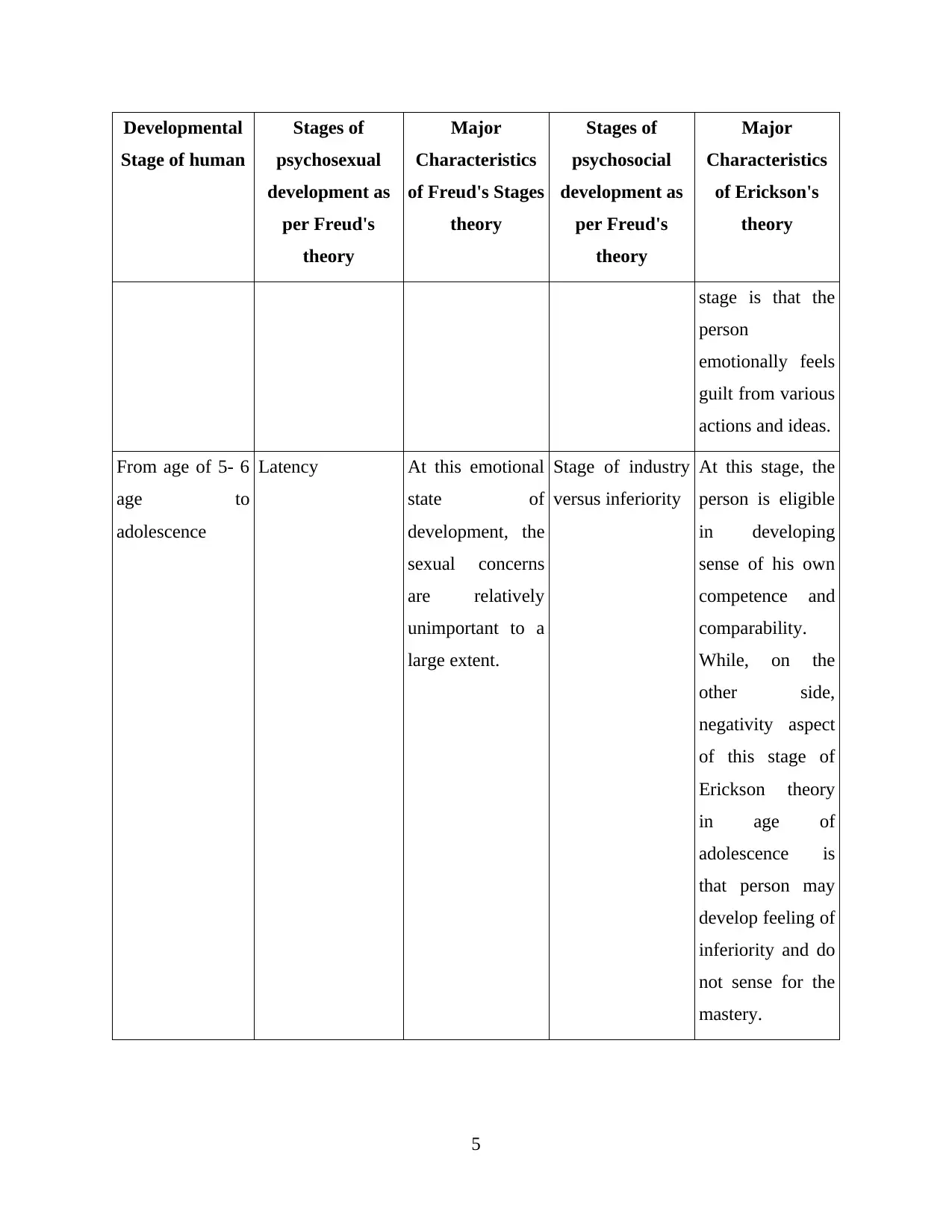
Developmental
Stage of human
Stages of
psychosexual
development as
per Freud's
theory
Major
Characteristics
of Freud's Stages
theory
Stages of
psychosocial
development as
per Freud's
theory
Major
Characteristics
of Erickson's
theory
stage is that the
person
emotionally feels
guilt from various
actions and ideas.
From age of 5- 6
age to
adolescence
Latency At this emotional
state of
development, the
sexual concerns
are relatively
unimportant to a
large extent.
Stage of industry
versus inferiority
At this stage, the
person is eligible
in developing
sense of his own
competence and
comparability.
While, on the
other side,
negativity aspect
of this stage of
Erickson theory
in age of
adolescence is
that person may
develop feeling of
inferiority and do
not sense for the
mastery.
5
Stage of human
Stages of
psychosexual
development as
per Freud's
theory
Major
Characteristics
of Freud's Stages
theory
Stages of
psychosocial
development as
per Freud's
theory
Major
Characteristics
of Erickson's
theory
stage is that the
person
emotionally feels
guilt from various
actions and ideas.
From age of 5- 6
age to
adolescence
Latency At this emotional
state of
development, the
sexual concerns
are relatively
unimportant to a
large extent.
Stage of industry
versus inferiority
At this stage, the
person is eligible
in developing
sense of his own
competence and
comparability.
While, on the
other side,
negativity aspect
of this stage of
Erickson theory
in age of
adolescence is
that person may
develop feeling of
inferiority and do
not sense for the
mastery.
5
Paraphrase This Document
Need a fresh take? Get an instant paraphrase of this document with our AI Paraphraser
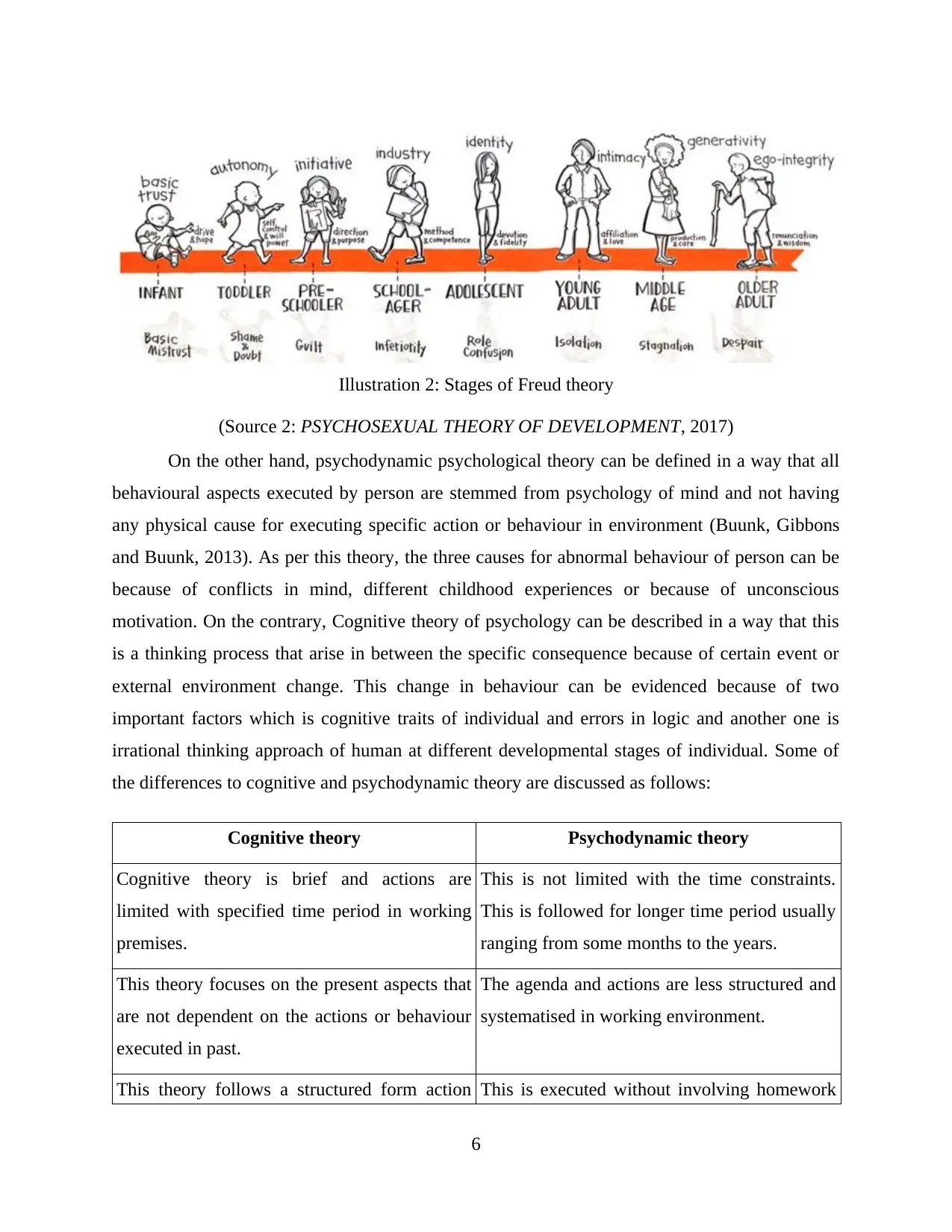
On the other hand, psychodynamic psychological theory can be defined in a way that all
behavioural aspects executed by person are stemmed from psychology of mind and not having
any physical cause for executing specific action or behaviour in environment (Buunk, Gibbons
and Buunk, 2013). As per this theory, the three causes for abnormal behaviour of person can be
because of conflicts in mind, different childhood experiences or because of unconscious
motivation. On the contrary, Cognitive theory of psychology can be described in a way that this
is a thinking process that arise in between the specific consequence because of certain event or
external environment change. This change in behaviour can be evidenced because of two
important factors which is cognitive traits of individual and errors in logic and another one is
irrational thinking approach of human at different developmental stages of individual. Some of
the differences to cognitive and psychodynamic theory are discussed as follows:
Cognitive theory Psychodynamic theory
Cognitive theory is brief and actions are
limited with specified time period in working
premises.
This is not limited with the time constraints.
This is followed for longer time period usually
ranging from some months to the years.
This theory focuses on the present aspects that
are not dependent on the actions or behaviour
executed in past.
The agenda and actions are less structured and
systematised in working environment.
This theory follows a structured form action This is executed without involving homework
6
Illustration 2: Stages of Freud theory
(Source 2: PSYCHOSEXUAL THEORY OF DEVELOPMENT, 2017)
behavioural aspects executed by person are stemmed from psychology of mind and not having
any physical cause for executing specific action or behaviour in environment (Buunk, Gibbons
and Buunk, 2013). As per this theory, the three causes for abnormal behaviour of person can be
because of conflicts in mind, different childhood experiences or because of unconscious
motivation. On the contrary, Cognitive theory of psychology can be described in a way that this
is a thinking process that arise in between the specific consequence because of certain event or
external environment change. This change in behaviour can be evidenced because of two
important factors which is cognitive traits of individual and errors in logic and another one is
irrational thinking approach of human at different developmental stages of individual. Some of
the differences to cognitive and psychodynamic theory are discussed as follows:
Cognitive theory Psychodynamic theory
Cognitive theory is brief and actions are
limited with specified time period in working
premises.
This is not limited with the time constraints.
This is followed for longer time period usually
ranging from some months to the years.
This theory focuses on the present aspects that
are not dependent on the actions or behaviour
executed in past.
The agenda and actions are less structured and
systematised in working environment.
This theory follows a structured form action This is executed without involving homework
6
Illustration 2: Stages of Freud theory
(Source 2: PSYCHOSEXUAL THEORY OF DEVELOPMENT, 2017)
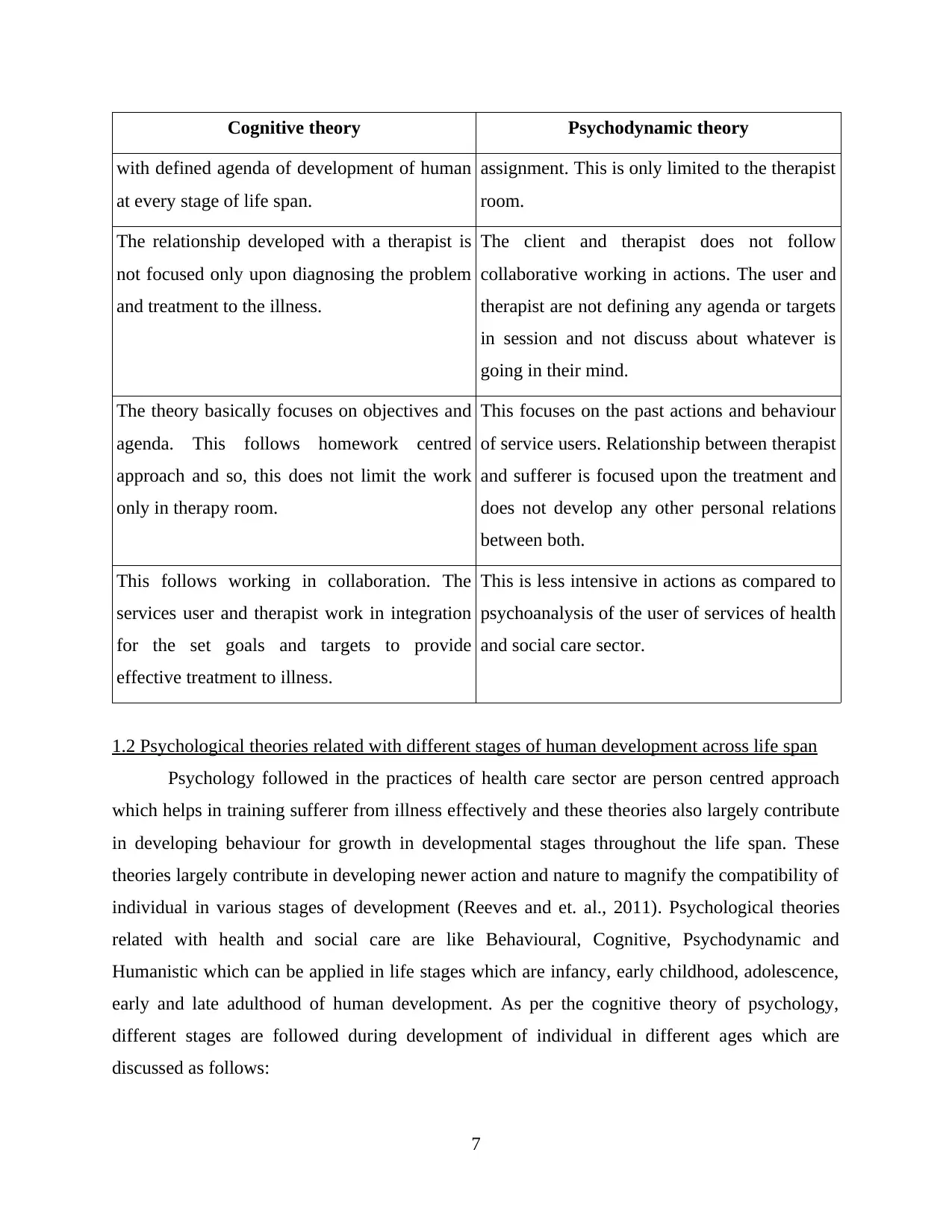
Cognitive theory Psychodynamic theory
with defined agenda of development of human
at every stage of life span.
assignment. This is only limited to the therapist
room.
The relationship developed with a therapist is
not focused only upon diagnosing the problem
and treatment to the illness.
The client and therapist does not follow
collaborative working in actions. The user and
therapist are not defining any agenda or targets
in session and not discuss about whatever is
going in their mind.
The theory basically focuses on objectives and
agenda. This follows homework centred
approach and so, this does not limit the work
only in therapy room.
This focuses on the past actions and behaviour
of service users. Relationship between therapist
and sufferer is focused upon the treatment and
does not develop any other personal relations
between both.
This follows working in collaboration. The
services user and therapist work in integration
for the set goals and targets to provide
effective treatment to illness.
This is less intensive in actions as compared to
psychoanalysis of the user of services of health
and social care sector.
1.2 Psychological theories related with different stages of human development across life span
Psychology followed in the practices of health care sector are person centred approach
which helps in training sufferer from illness effectively and these theories also largely contribute
in developing behaviour for growth in developmental stages throughout the life span. These
theories largely contribute in developing newer action and nature to magnify the compatibility of
individual in various stages of development (Reeves and et. al., 2011). Psychological theories
related with health and social care are like Behavioural, Cognitive, Psychodynamic and
Humanistic which can be applied in life stages which are infancy, early childhood, adolescence,
early and late adulthood of human development. As per the cognitive theory of psychology,
different stages are followed during development of individual in different ages which are
discussed as follows:
7
with defined agenda of development of human
at every stage of life span.
assignment. This is only limited to the therapist
room.
The relationship developed with a therapist is
not focused only upon diagnosing the problem
and treatment to the illness.
The client and therapist does not follow
collaborative working in actions. The user and
therapist are not defining any agenda or targets
in session and not discuss about whatever is
going in their mind.
The theory basically focuses on objectives and
agenda. This follows homework centred
approach and so, this does not limit the work
only in therapy room.
This focuses on the past actions and behaviour
of service users. Relationship between therapist
and sufferer is focused upon the treatment and
does not develop any other personal relations
between both.
This follows working in collaboration. The
services user and therapist work in integration
for the set goals and targets to provide
effective treatment to illness.
This is less intensive in actions as compared to
psychoanalysis of the user of services of health
and social care sector.
1.2 Psychological theories related with different stages of human development across life span
Psychology followed in the practices of health care sector are person centred approach
which helps in training sufferer from illness effectively and these theories also largely contribute
in developing behaviour for growth in developmental stages throughout the life span. These
theories largely contribute in developing newer action and nature to magnify the compatibility of
individual in various stages of development (Reeves and et. al., 2011). Psychological theories
related with health and social care are like Behavioural, Cognitive, Psychodynamic and
Humanistic which can be applied in life stages which are infancy, early childhood, adolescence,
early and late adulthood of human development. As per the cognitive theory of psychology,
different stages are followed during development of individual in different ages which are
discussed as follows:
7
⊘ This is a preview!⊘
Do you want full access?
Subscribe today to unlock all pages.

Trusted by 1+ million students worldwide
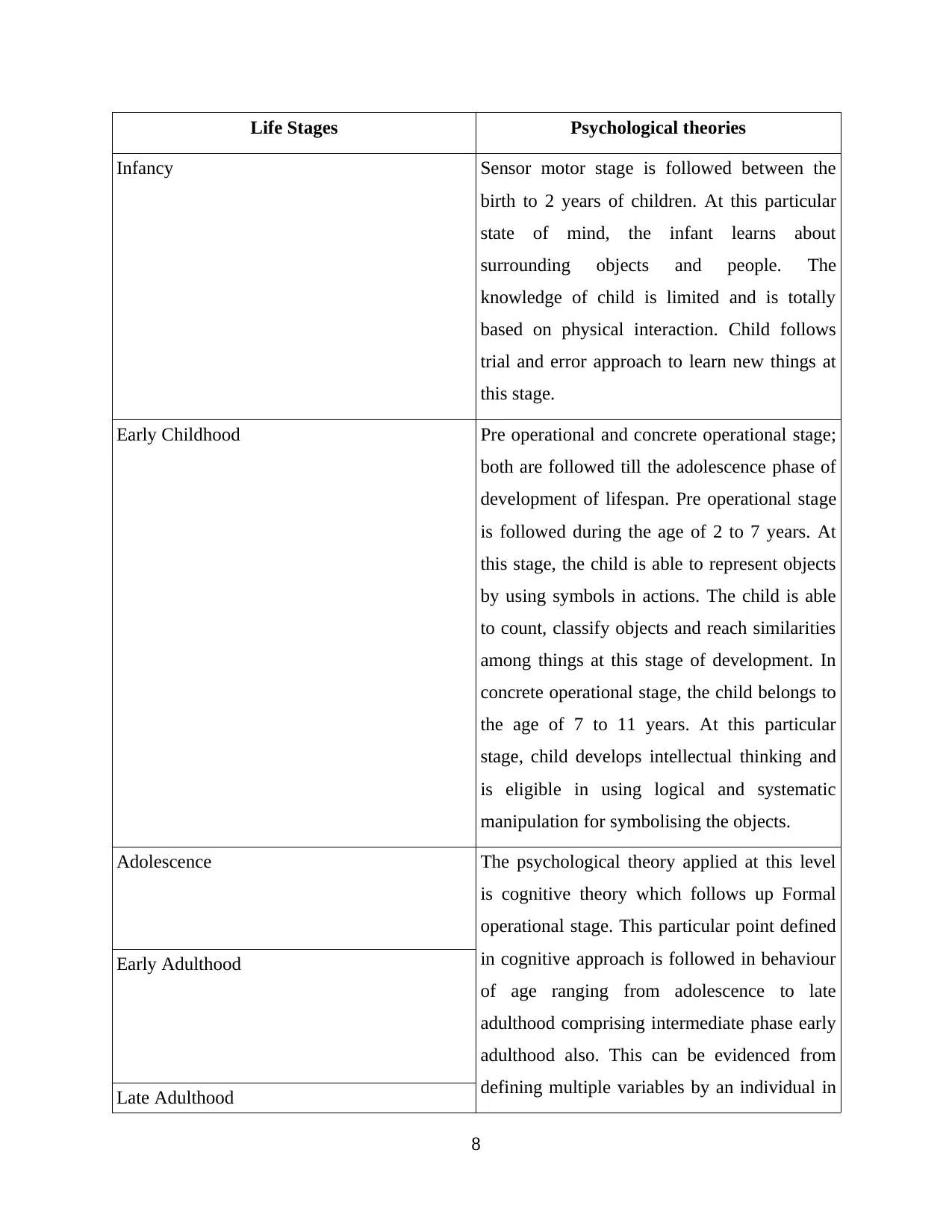
Life Stages Psychological theories
Infancy Sensor motor stage is followed between the
birth to 2 years of children. At this particular
state of mind, the infant learns about
surrounding objects and people. The
knowledge of child is limited and is totally
based on physical interaction. Child follows
trial and error approach to learn new things at
this stage.
Early Childhood Pre operational and concrete operational stage;
both are followed till the adolescence phase of
development of lifespan. Pre operational stage
is followed during the age of 2 to 7 years. At
this stage, the child is able to represent objects
by using symbols in actions. The child is able
to count, classify objects and reach similarities
among things at this stage of development. In
concrete operational stage, the child belongs to
the age of 7 to 11 years. At this particular
stage, child develops intellectual thinking and
is eligible in using logical and systematic
manipulation for symbolising the objects.
Adolescence The psychological theory applied at this level
is cognitive theory which follows up Formal
operational stage. This particular point defined
in cognitive approach is followed in behaviour
of age ranging from adolescence to late
adulthood comprising intermediate phase early
adulthood also. This can be evidenced from
defining multiple variables by an individual in
Early Adulthood
Late Adulthood
8
Infancy Sensor motor stage is followed between the
birth to 2 years of children. At this particular
state of mind, the infant learns about
surrounding objects and people. The
knowledge of child is limited and is totally
based on physical interaction. Child follows
trial and error approach to learn new things at
this stage.
Early Childhood Pre operational and concrete operational stage;
both are followed till the adolescence phase of
development of lifespan. Pre operational stage
is followed during the age of 2 to 7 years. At
this stage, the child is able to represent objects
by using symbols in actions. The child is able
to count, classify objects and reach similarities
among things at this stage of development. In
concrete operational stage, the child belongs to
the age of 7 to 11 years. At this particular
stage, child develops intellectual thinking and
is eligible in using logical and systematic
manipulation for symbolising the objects.
Adolescence The psychological theory applied at this level
is cognitive theory which follows up Formal
operational stage. This particular point defined
in cognitive approach is followed in behaviour
of age ranging from adolescence to late
adulthood comprising intermediate phase early
adulthood also. This can be evidenced from
defining multiple variables by an individual in
Early Adulthood
Late Adulthood
8
Paraphrase This Document
Need a fresh take? Get an instant paraphrase of this document with our AI Paraphraser
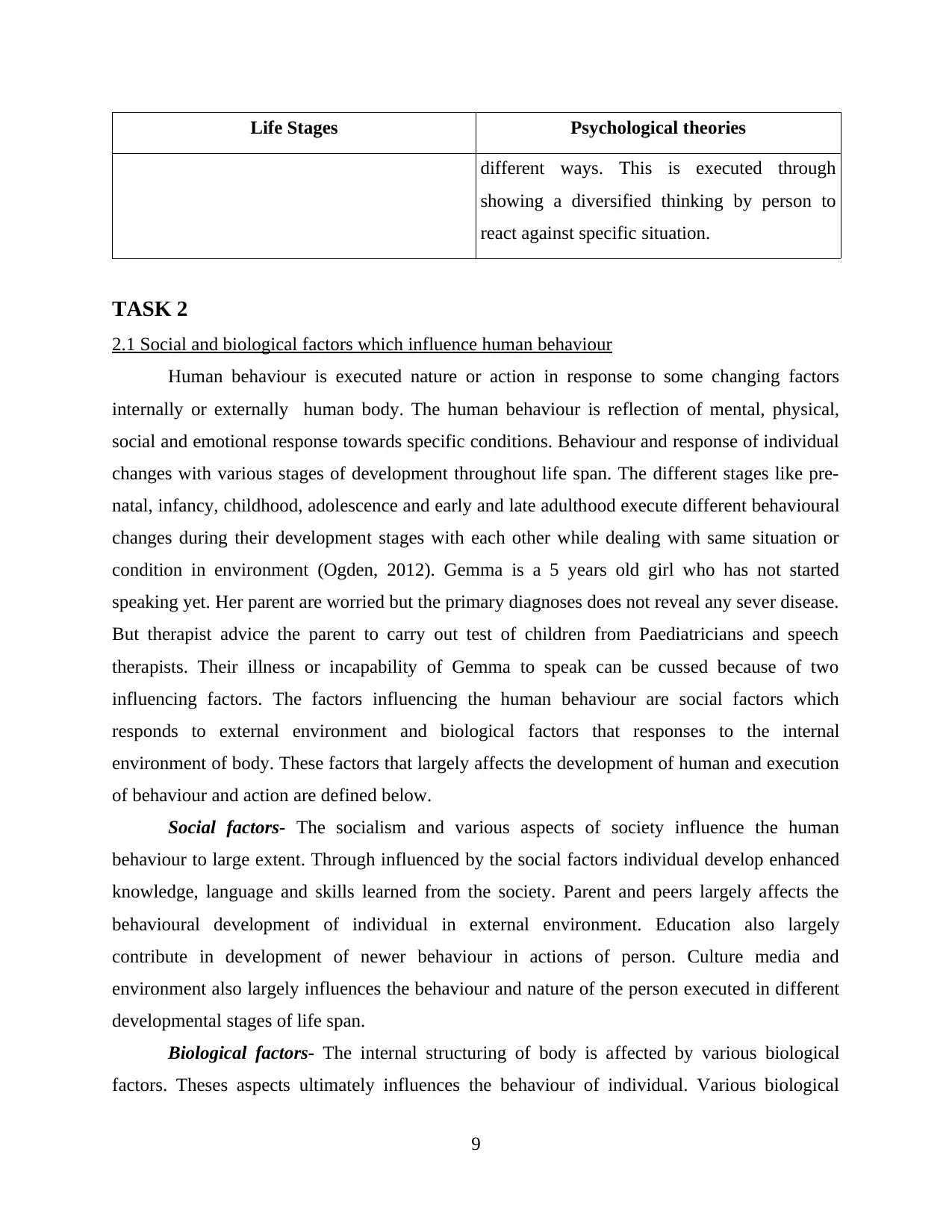
Life Stages Psychological theories
different ways. This is executed through
showing a diversified thinking by person to
react against specific situation.
TASK 2
2.1 Social and biological factors which influence human behaviour
Human behaviour is executed nature or action in response to some changing factors
internally or externally human body. The human behaviour is reflection of mental, physical,
social and emotional response towards specific conditions. Behaviour and response of individual
changes with various stages of development throughout life span. The different stages like pre-
natal, infancy, childhood, adolescence and early and late adulthood execute different behavioural
changes during their development stages with each other while dealing with same situation or
condition in environment (Ogden, 2012). Gemma is a 5 years old girl who has not started
speaking yet. Her parent are worried but the primary diagnoses does not reveal any sever disease.
But therapist advice the parent to carry out test of children from Paediatricians and speech
therapists. Their illness or incapability of Gemma to speak can be cussed because of two
influencing factors. The factors influencing the human behaviour are social factors which
responds to external environment and biological factors that responses to the internal
environment of body. These factors that largely affects the development of human and execution
of behaviour and action are defined below.
Social factors- The socialism and various aspects of society influence the human
behaviour to large extent. Through influenced by the social factors individual develop enhanced
knowledge, language and skills learned from the society. Parent and peers largely affects the
behavioural development of individual in external environment. Education also largely
contribute in development of newer behaviour in actions of person. Culture media and
environment also largely influences the behaviour and nature of the person executed in different
developmental stages of life span.
Biological factors- The internal structuring of body is affected by various biological
factors. Theses aspects ultimately influences the behaviour of individual. Various biological
9
different ways. This is executed through
showing a diversified thinking by person to
react against specific situation.
TASK 2
2.1 Social and biological factors which influence human behaviour
Human behaviour is executed nature or action in response to some changing factors
internally or externally human body. The human behaviour is reflection of mental, physical,
social and emotional response towards specific conditions. Behaviour and response of individual
changes with various stages of development throughout life span. The different stages like pre-
natal, infancy, childhood, adolescence and early and late adulthood execute different behavioural
changes during their development stages with each other while dealing with same situation or
condition in environment (Ogden, 2012). Gemma is a 5 years old girl who has not started
speaking yet. Her parent are worried but the primary diagnoses does not reveal any sever disease.
But therapist advice the parent to carry out test of children from Paediatricians and speech
therapists. Their illness or incapability of Gemma to speak can be cussed because of two
influencing factors. The factors influencing the human behaviour are social factors which
responds to external environment and biological factors that responses to the internal
environment of body. These factors that largely affects the development of human and execution
of behaviour and action are defined below.
Social factors- The socialism and various aspects of society influence the human
behaviour to large extent. Through influenced by the social factors individual develop enhanced
knowledge, language and skills learned from the society. Parent and peers largely affects the
behavioural development of individual in external environment. Education also largely
contribute in development of newer behaviour in actions of person. Culture media and
environment also largely influences the behaviour and nature of the person executed in different
developmental stages of life span.
Biological factors- The internal structuring of body is affected by various biological
factors. Theses aspects ultimately influences the behaviour of individual. Various biological
9
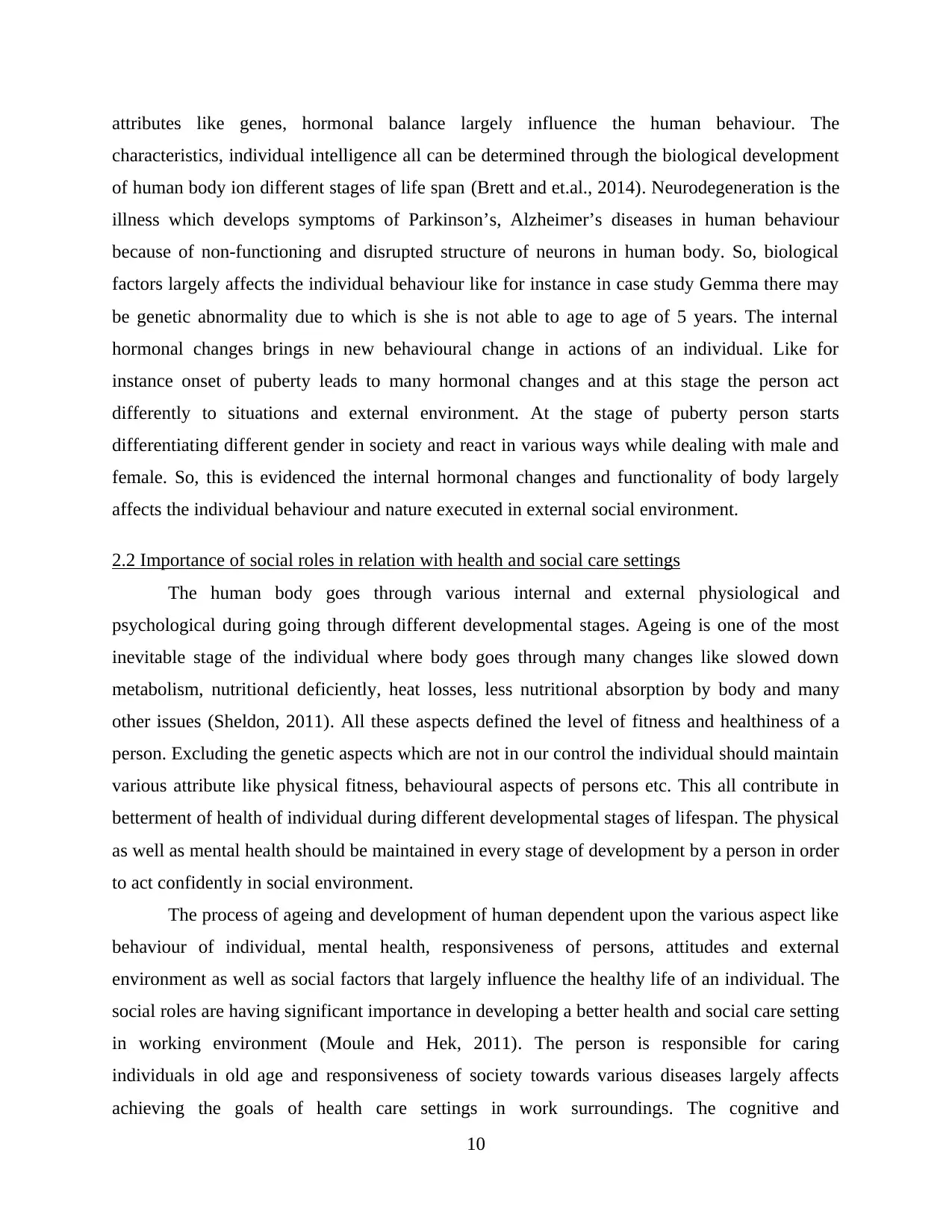
attributes like genes, hormonal balance largely influence the human behaviour. The
characteristics, individual intelligence all can be determined through the biological development
of human body ion different stages of life span (Brett and et.al., 2014). Neurodegeneration is the
illness which develops symptoms of Parkinson’s, Alzheimer’s diseases in human behaviour
because of non-functioning and disrupted structure of neurons in human body. So, biological
factors largely affects the individual behaviour like for instance in case study Gemma there may
be genetic abnormality due to which is she is not able to age to age of 5 years. The internal
hormonal changes brings in new behavioural change in actions of an individual. Like for
instance onset of puberty leads to many hormonal changes and at this stage the person act
differently to situations and external environment. At the stage of puberty person starts
differentiating different gender in society and react in various ways while dealing with male and
female. So, this is evidenced the internal hormonal changes and functionality of body largely
affects the individual behaviour and nature executed in external social environment.
2.2 Importance of social roles in relation with health and social care settings
The human body goes through various internal and external physiological and
psychological during going through different developmental stages. Ageing is one of the most
inevitable stage of the individual where body goes through many changes like slowed down
metabolism, nutritional deficiently, heat losses, less nutritional absorption by body and many
other issues (Sheldon, 2011). All these aspects defined the level of fitness and healthiness of a
person. Excluding the genetic aspects which are not in our control the individual should maintain
various attribute like physical fitness, behavioural aspects of persons etc. This all contribute in
betterment of health of individual during different developmental stages of lifespan. The physical
as well as mental health should be maintained in every stage of development by a person in order
to act confidently in social environment.
The process of ageing and development of human dependent upon the various aspect like
behaviour of individual, mental health, responsiveness of persons, attitudes and external
environment as well as social factors that largely influence the healthy life of an individual. The
social roles are having significant importance in developing a better health and social care setting
in working environment (Moule and Hek, 2011). The person is responsible for caring
individuals in old age and responsiveness of society towards various diseases largely affects
achieving the goals of health care settings in work surroundings. The cognitive and
10
characteristics, individual intelligence all can be determined through the biological development
of human body ion different stages of life span (Brett and et.al., 2014). Neurodegeneration is the
illness which develops symptoms of Parkinson’s, Alzheimer’s diseases in human behaviour
because of non-functioning and disrupted structure of neurons in human body. So, biological
factors largely affects the individual behaviour like for instance in case study Gemma there may
be genetic abnormality due to which is she is not able to age to age of 5 years. The internal
hormonal changes brings in new behavioural change in actions of an individual. Like for
instance onset of puberty leads to many hormonal changes and at this stage the person act
differently to situations and external environment. At the stage of puberty person starts
differentiating different gender in society and react in various ways while dealing with male and
female. So, this is evidenced the internal hormonal changes and functionality of body largely
affects the individual behaviour and nature executed in external social environment.
2.2 Importance of social roles in relation with health and social care settings
The human body goes through various internal and external physiological and
psychological during going through different developmental stages. Ageing is one of the most
inevitable stage of the individual where body goes through many changes like slowed down
metabolism, nutritional deficiently, heat losses, less nutritional absorption by body and many
other issues (Sheldon, 2011). All these aspects defined the level of fitness and healthiness of a
person. Excluding the genetic aspects which are not in our control the individual should maintain
various attribute like physical fitness, behavioural aspects of persons etc. This all contribute in
betterment of health of individual during different developmental stages of lifespan. The physical
as well as mental health should be maintained in every stage of development by a person in order
to act confidently in social environment.
The process of ageing and development of human dependent upon the various aspect like
behaviour of individual, mental health, responsiveness of persons, attitudes and external
environment as well as social factors that largely influence the healthy life of an individual. The
social roles are having significant importance in developing a better health and social care setting
in working environment (Moule and Hek, 2011). The person is responsible for caring
individuals in old age and responsiveness of society towards various diseases largely affects
achieving the goals of health care settings in work surroundings. The cognitive and
10
⊘ This is a preview!⊘
Do you want full access?
Subscribe today to unlock all pages.

Trusted by 1+ million students worldwide
1 out of 18
Related Documents
Your All-in-One AI-Powered Toolkit for Academic Success.
+13062052269
info@desklib.com
Available 24*7 on WhatsApp / Email
![[object Object]](/_next/static/media/star-bottom.7253800d.svg)
Unlock your academic potential
Copyright © 2020–2026 A2Z Services. All Rights Reserved. Developed and managed by ZUCOL.





